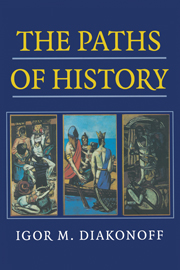Book contents
- Frontmatter
- Contents
- Foreword by Geoffrey Hoskins
- Preface
- Introduction
- 1 First Phase (Primitive)
- 2 Second Phase (Primitive Communal)
- 3 Third Phase (Early Antiquity)
- 4 Fourth Phase (Imperial Antiquity)
- 5 Fifth Phase (the Middle Ages)
- 6 Sixth Phase (the Stable Absolutist Post-Medieval Phase)
- 7 Seventh Phase (Capitalist)
- 8 Eighth Phase (Post-Capitalist)
- Index
3 - Third Phase (Early Antiquity)
Published online by Cambridge University Press: 02 December 2009
- Frontmatter
- Contents
- Foreword by Geoffrey Hoskins
- Preface
- Introduction
- 1 First Phase (Primitive)
- 2 Second Phase (Primitive Communal)
- 3 Third Phase (Early Antiquity)
- 4 Fourth Phase (Imperial Antiquity)
- 5 Fifth Phase (the Middle Ages)
- 6 Sixth Phase (the Stable Absolutist Post-Medieval Phase)
- 7 Seventh Phase (Capitalist)
- 8 Eighth Phase (Post-Capitalist)
- Index
Summary
Since the exploited class is clearly shaped in contrast to the class of freemen (as yet undifferentiated), the system of governing the society becomes institutionalised, it receives a constant, generally recognised structure and an apparatus for coercion; in other words, it becomes a state. When, on the one hand, a clearly defined exploited class is formed, and on the other hand so too is the state apparatus, then the Second Phase of historical development is over, and the Third Phase begins – the Phase of Early Antiquity, the first stage of class society.
If we assume that a mode of production is dependent, first, on the character of property relations, and, secondly, on the type of the combination between the labour force and the means of production, then we must regard antiquity not as one mode of production (certainly not a slave-owning mode of production), but as two clearly distinguished phases. Conventionally, we will call these the Third Phase (the Early, or Communal Antiquity), and the Fourth Phase (the Late, or Imperial Antiquity).
The transitional stage between the Primitive Communal, or Second Phase and the Ancient Communal, or Third Phase begins with the creation of big economies. They are organised either for the maintenance of the cult of the main community deity, or for the chief with his entourage. Such a chief is in the Russian scholarly tradition termed ‘czar’, i.e. emperor (from Latin caesar); but their power was by means imperial, and they rather resemble the early medieval kings (kuningaz); this term is actually usual in the Western scholarly literature. One might also call them ‘princes’.
- Type
- Chapter
- Information
- The Paths of History , pp. 21 - 36Publisher: Cambridge University PressPrint publication year: 1999



